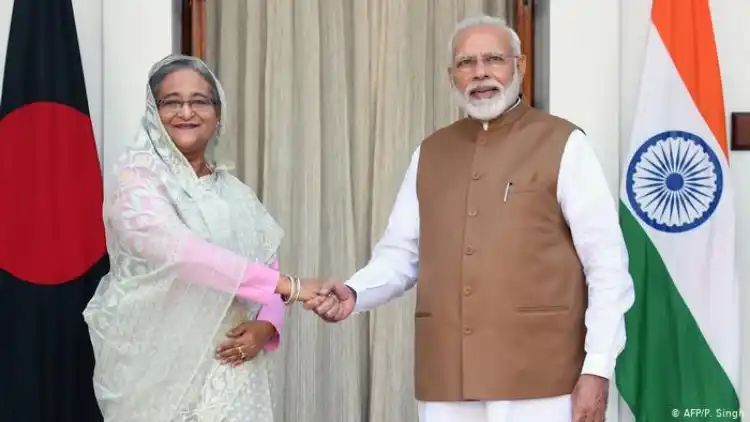
Shantanu Mukharji
Bangladesh Prime Minister, Sheikh Hasina completed 74 years on by September 28 this year. In the last 50 years of Bangladesh’s independence, she has been the Prime Minister for over 17 years. Her political journey has not been easy or uninterrupted; it was full of hurdles, threats to her life, and innumerable challenges and obstacles. The Iron Lady had been firm on her saddle with no distraction or provocation to unsettle her.
She was 28 when her father Sheikh Mujibur Rahman, father of the nation, was assassinated at his Dhaka Dhanmondi residence along with all his family members including a ten-year-old son, on August 15, 1975. On that dark day, Hasina was in Germany with her sister, Rehana, and survived. She was destined to live and lead the country from the front.
After remaining in oblivion for six years, Sheikh Hasina became emerged stronger to take on the conspirators who were responsible for murdering Mujibur Rahman and his family members. It was not an ordinary murder of the head of the country. The plotters had the full support of extraneous powers including Pakistan, Libya, etc. It is a sad commentary on part of the then Bangladeshi military leadership and politicians including Khondokar Mushtaq, a minister in Mujib Cabinet, to have aligned with the military elements in this bloody coup to topple the Mujibur Rahman government. Bangladesh was a nascent, four-year-old country. It’s ironic that same Pakistan, Bengalis fought against for freedom, was a key player in plotting the coup.
Six years later, Sheikh Hasina returned to Dhaka in May 1981. It’s not easy to return to one’s country when a hostile and anti-liberation government led by the turncoat dictator, Gen Zia ur Rahman was in charge.
Zia was a megalomaniac while all his ministers were acerbically inimical to secularism, and liberal forces. It had to be her inner strength that brought Hasina to Dhaka. She was accorded a hearty welcome. In hindsight, Zia must have realized it was his biggest miscalculation; they had underestimated this woman’s determination and commitment. Sheikh Hasina launched a political movement against the Zia regime. Soon after returning, Hasina organized the Awami League (AL), the party founded by her father, that was in tatters and leaderless.
She charged the cadres with confidence amid very turbulent developments in the country including the assassination of Zia-ur-Rahman on May 30, 1981. It looks shaky again as the military was trying to flex its muscles. Undaunted, Hasina moved on facing a group of the most intolerant opponent.
A year later, another dictator Gen HM Ershad, who was a repatriate (from Pakistan) officer, assumed charge of the country in 1982 as the Chief Martial Law Administrator (CMLA). Nothing had changed for Hasina or her country. Religious extremism continued to rise to strengthen the fundamentals. Plus, Ershad like Zia, set up his political outfit called Jatiya Party (JP).
Thoroughly corrupt and intolerant, Ershad created more blocks in Hasina’s journey. The lady remained calm and undeterred. Ershad’s nine-year rule was marked by nepotism, mal-governance, and high corruption. It had also systematically fostered communal disharmony and divisive politics.
Most unfortunately for Hasina, in the 1991 parliamentary elections, Bangladesh National Party (BNP) under Zia’s widow Khaleda came to power. Hasina’s challenges multiplied. The right-wing Jamaat e Islami (JeI) collaborated with the BNP pursuing its anti-India agenda. After five years, in the 1996 polls, Hasina led the Awami League party to win the general elections. She completed her five-year term in 2001. Her first spell as the PM saw a lot of changes in Bangladesh.
Hasina led the opposition during the BNP/Khaleda Zia rule from 2001 to 2006. During this time, she added to her `to do's' list as Khaleda and her son Tareqhad, sheltered all the anti-India insurgent groups including the ULFA, the Nagas, the Manipuris, and many more. BNP was in a mood to rewrite history by deleting India's historic role in the Bangladesh freedom struggle. Pakistan was a collaborator in BNP leaders’ attempts to wean a common man from India.
Hasina was back in power in 2009 after three years. From 2009 to date, there is no looking back for her. At the age of 74, she looks back with pride on her accomplishments. From India’s point of view, she doggedly got rid of all the training camps and presence of anti-India Insurgents from her country’s soil. Showing dexterity and farsightedness, Hasina resolved the bilateral issues on water sharing and enclaves.
Even if Teesta remains unresolved, Hasina refused to get provoked and continues her tight rope walking on it. That’s what political maturity is all about. Hasina handled the Rohingya crisis of 2017 with sobriety without any aggression. She was able to rein in the menace of terror and spiraling fundamentalism with reasonable tact though the challenge still looms large. Very significantly, Hasina pursued fair trials of the war criminals and collaborators of 1971 genocide and their subsequent execution. This is no mean achievement.
Hasina, the statesman, carried on her robust foreign policy with bilateral and multilateral relations with almost all the countries with dignity.
Today, Bangladesh has a sound economy; women are emancipated and the country is looking promising to carve a new niche, globally. Having said this, a word of caution for Sheikh Hasina’s personal safety and security perhaps calls for a close watch. One is not privy on her threat assessments yet it would appear advisable to doubly ensure that the forces akin to radicals and religious extremists try and attempt any misadventure. BD military and security establishment have aged gracefully attaining professional maturity but that notwithstanding this task deserves priority on when we assess her progress report on her 75th birthday.
(Writer is a retired IPS officer, a security analyst and a former National Security Advisor to the Prime Minister of Mauritius. He was also posted in Bangladesh and has been a BD watcher for over four decades. Views are personal)
